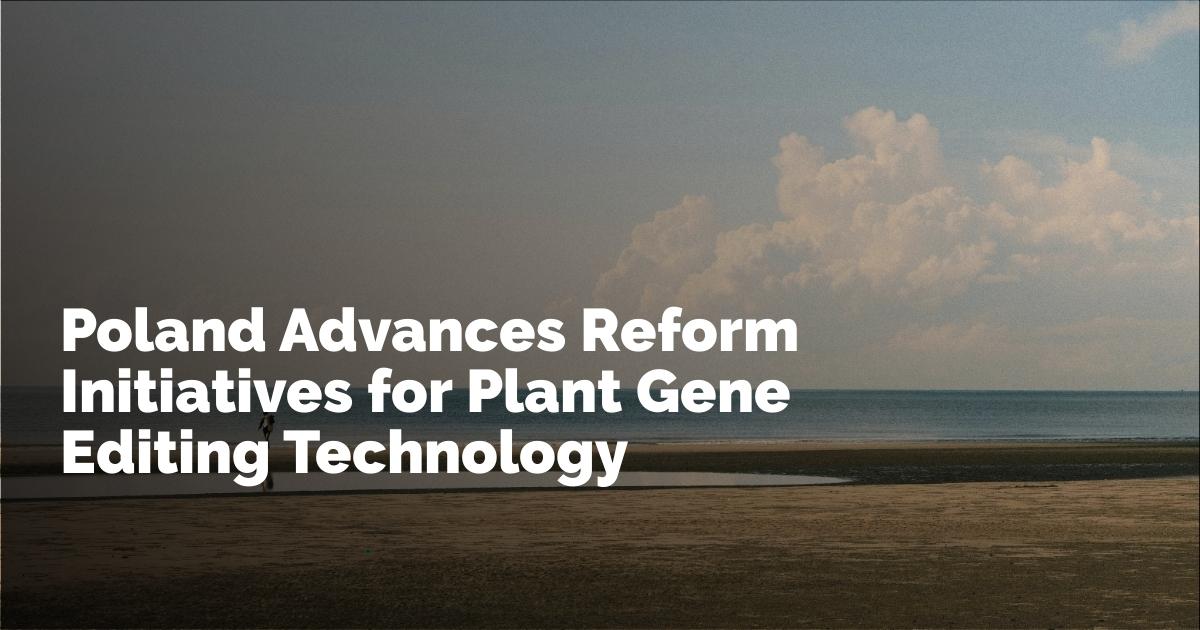Poland's Role in EU Gene Editing Reforms
The landscape of agricultural biotechnology within the European Union is witnessing a transformative phase, with Poland playing a pivotal role. The country is actively advocating for reform in EU rules governing genetically modified plants, a topic that has been contentious for years. As of early 2024, the European Parliament has reached a consensus on the subject, yet a qualified majority among EU governments remains elusive. Poland, holding the EU presidency, is keen on ushering in compromise and progress.
The Significance of Gene Editing in Agriculture
Gene editing technology offers a revolutionary approach to enhancing plant traits, thereby increasing crop resilience and nutritional quality. This advancement is crucial for addressing challenges like food security and European competitiveness in agriculture. By making plants more resilient to adverse conditions such as drought and disease, gene editing provides a promising solution in our fight against climate change and food shortages.
The Compromise Proposal
In January, Warsaw submitted a compromise text aiming to break the stalemate. Following technical discussions, this text was slated for review by the Council working party on genetic resources and innovation in agriculture. The nation intends to balance diverse interests, seeking a coherent position that might pave the way for the proposal's presentation at the Agriculture and Fisheries Council meeting in June.
The Divide Among Member States
Despite the diplomatic push, significant opposition persists. Countries like France, Germany, Romania, Greece, Austria, Hungary, Croatia, and Slovakia form a steadfast minority against Poland's proposed reforms. Their resistance highlights the complexity and divisiveness of the topic within the EU.
Differing Perspectives: Friends of the Earth and Industry Stakeholders
Civil society groups raise concerns over the potential environmental and social impacts of deregulating gene editing. Friends of the Earth Europe, monitoring the proposal closely, has identified critical issues such as intellectual property rights and their effects on farmers and breeders. Contrastingly, industry leaders like Bayer believe that the proposed reforms will foster innovation and enable Europe to maintain a competitive edge globally.
Technical Categories and Regulatory Challenges
The European Commission's 2023 proposition suggests a dual-category approach to genetically modified plants created via new genomic techniques (NGTs), a method seen as more controlled than traditional genetic modifications. Plants akin to those produced by conventional breeding methods (Category 1) would be exempt from existing GMO regulations, while others (Category 2) would remain under stricter GMO oversight.
Controversies Around Intellectual Property and Regulation
One contentious element of the debate is the distinction in intellectual property rights, particularly concerning patents. The Polish compromise attempts to navigate this by differentiating between patents protecting basic gene technologies and those concerning specific traits. However, the idea of resolving intellectual property issues via GMO legislation is met with skepticism by some advocates, who argue this could hinder sustainable agriculture by increasing corporate control over genetic resources.
Concerns Over Monocultures and Genetic Diversity
Critics highlight the risk of fostering monocultures—homogenous crops over vast areas that can be vulnerable to pests and diseases. They emphasize the necessity for genetic diversity to enhance climate resilience and ensure sustainable agricultural practices. Moreover, they fear that unchecked adoption of NGTs might threaten small-scale farmers' access to diverse seed varieties, a sentiment echoed by voices like Nina Holland of Corporate Europe Observatory.
Industry's Vision for Innovation
On the other side, the plant breeding industry stresses the importance of disseminating innovation without overly complex or localized regulatory hurdles. Their argument is rooted in the belief that a harmonized EU seed market is crucial for ensuring wide access to agricultural advancements.
The Impact of Global Competitiveness
A significant concern for industry leaders, including Bayer, is the growing technology gap between the EU and other regions such as the United States and China, which are moving quickly in genome editing. Without an enabling framework, the EU risks lagging in innovation and investment in this critical field.
Conclusion: A Delicate Path Forward
As Poland continues to navigate the complex landscape of gene editing reform, it faces the formidable task of balancing diverse opinions and national interests. The outcome of these efforts remains uncertain. However, the stakes are high, with potential implications for Europe's agricultural competitiveness, environmental sustainability, and social equity in the coming decades. Ultimately, the success of this initiative may set a precedent for how European nations approach biotechnology and food security challenges in the future.
출처 : Original Source

